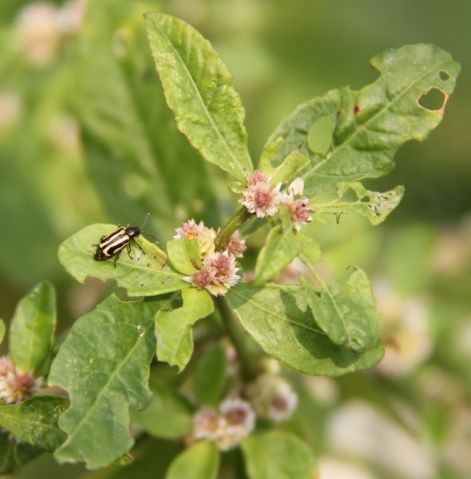Climate Warming Increases Biological Control Agent Impact on A Non-target Species
2014-11-18
Global climate change may facilitate alien species invasions and exacerbate their detrimental impacts on natural ecosystems, agriculture and human society. Introduction of coevolved natural enemies from an invasive species’ home range (classical biological control) has been one of the key methods for suppressing invasive species. However, the deliberate exotic insects introduction may negatively affect native food webs and ecosystems, causing non-target effect. Given climate change can shift interactions of invasive plants, herbivorous insects and native species, studies of risks to non-target species from biocontrol agents under climate change are critical for future management of invasive species and conservation of native species
Researchers from the biological invasion lab in Wuhan Botanical Garden in collaboration with Professor Evan Siemann from Rice University evaluated climate warming impacts on abundance and damage of the introduced biocontrol beetle Agasicles hygrophila on the non-target native host plant Alternanthera sessilis in China. They conducted extensive field surveys across a latitudinal gradient covering their full distributions and a 2-year warming experiment near the northern limit of the beetle’s distribution in China.
This work was the first study combining field surveys and experiments to examine how climate changed impacts non-target effects of biocontrol introductions. In field surveys, they found that A. hygrophila damage on non-target A. sessilis increased along latitudes with rising temperature and plant life history changed from perennial to annual. Warming experiment showed that elevated temperature allowed A. hygrophila to maintain population by improving overwintering and increased beetle impacts on non-target seedling recruitment.
Together, these results suggest that global warming can shift phenologies, increase the magnitude of non-target effects and expand these non-target effects to additional areas where A. sessilis occurs.
This study improves the understanding of how invasive plants, biocontrol agents and associated native species respond to climate change. It is critical for informing future management of biological invasions and conservation of native species.
This work was funded by the National Science Foundation of China, US-NSF, and the Knowledge Innovation Program of the Chinese Academy of Sciences and Wuhan Botanical Garden. Results were published in Ecology Letters online entitled “Climate warming increases biological control agent impact on a non-target species”.

Adult beetle of the introduced biocontrol agent Agasicles hygrophila feeds on the non-target native host plant Alternanthera sessilis (photo credit: Minyan He)